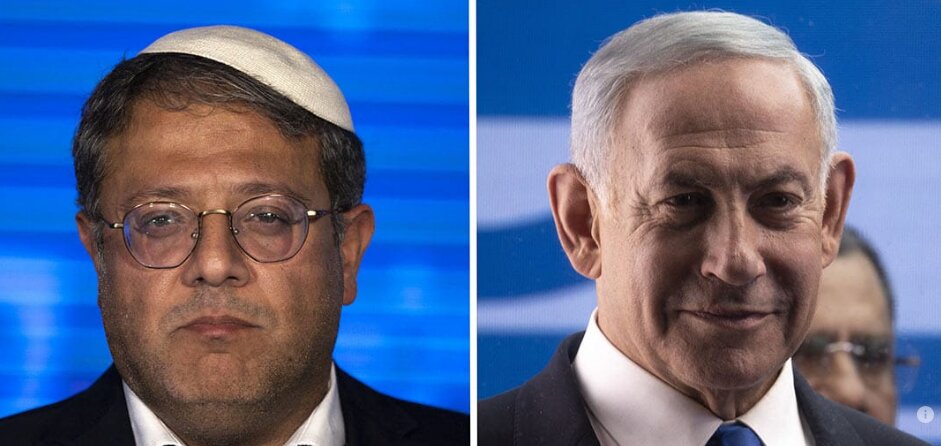Beyond Netanyahu: Pioneering a New Era for Israel’s Right-Wing Politics
As Netanyahu’s influence wanes over Israeli politics, a new political landscape within the Zionist right is starting to take shape. The long-standing era of Netanyahu, a figure who has dominated Israel’s political scene for more than a decade, appears to be reaching its conclusion. Recent polls, with the exception of those conducted by Israel’s Channel 14 television, indicate a significant decline in Netanyahu’s grip on power, hinting at a potential end to his reign as a leader synonymous with Israel’s right-wing politics.
The Shifting Sands of Political Stability
Throughout his unprecedented tenure, Benjamin “Bibi” Netanyahu has served as both a symbol of political continuity and a growing source of division within Israeli society. From 2009 to 2019, Netanyahu and his Likud party were seen as pillars of stability, forging coalitions that revolved around his leadership. However, as time progressed, the appeal of aligning with Netanyahu began to diminish, particularly as his ambition overshadowed inclusivity.
- Early coalitions, such as those with the Labor Party under Ehud Barak in 2011, were short-lived.
- Notable centrist figures like Yair Lapid and Tzipi Livni joined Netanyahu’s cabinet in 2013 but faced dismissal by the end of 2014.
- Key allies, including Avigdor Lieberman of Yisrael Beiteinu, distanced themselves from Netanyahu, highlighting a broader trend of disenchantment.
This trend peaked in 2018 when disagreements over a ceasefire with Hamas led to Lieberman’s departure from the coalition. Subsequently, Israel experienced five consecutive elections between 2019 and 2022, showcasing the chaos in the political landscape. Former generals like Benny Gantz and long-time allies such as Naftali Bennett transitioned from collaborators to critics, choosing to challenge Netanyahu rather than support him.
Despite his resilience during these turbulent times, Netanyahu’s tactics inflicted deep wounds on Israel’s political system. The recurrent nature of coalitions and the trauma from repeated elections underscored rising instability, with Netanyahu often viewed as the common denominator. When he regained power in November 2022, it was at the helm of the most right-wing and religiously hardline government in Israeli history—an achievement that was both celebrated and fraught with new dangers.
Judicial Reforms: A Self-Inflicted Wound?
The initial sparks of Netanyahu’s potential undoing were ignited by his own actions. His coalition, riding high on a numerical advantage, launched a controversial program of judicial reforms, which Justice Minister Yariv Levin described as necessary for curtailing the Supreme Court’s power.
- The proposed changes aimed at altering Israel’s governance by limiting the Supreme Court’s ability to override government decisions deemed unconstitutional.
- Unveiled in January 2023, these reforms immediately triggered widespread public protests, which continued for an unprecedented 39 weeks.
These demonstrations not only fractured Israeli society but also pulled the traditionally apolitical military and security apparatus into the internal crisis. The polarization weakened Netanyahu’s credibility and hampered the government’s focus on external threats. This domestic vulnerability may have contributed to Hamas’s audacious attacks on October 7, 2023, highlighting the risks of prioritizing internal skirmishes over external preparedness.
Following the October 7 attacks, public discontent surged, with Likud becoming the focal point of anger over military and intelligence failures. Polls conducted shortly thereafter indicated a dramatic drop in Likud’s projected Knesset seats, plummeting from 30 to between 15 and 17—an alarming decline for the ruling party.
The Aftershock and Netanyahu’s Partial Recovery
Although Netanyahu’s popularity initially plummeted in the aftermath of the October 7 disaster, subsequent military campaigns in Gaza, Lebanon, and Syria allowed him to regain some political footing. As the Israeli government adopted a more aggressive stance toward Hamas, public discontent began to ease, particularly among right-leaning voters. By early May 2025, Likud’s projected presence in the Knesset rebounded to 22-25 seats, restoring its status as Israel’s largest single party.
However, this recovery remains tenuous. Netanyahu’s struggles to form a stable coalition continue, as opposition parties—with potential backing from Arab factions—hold the upper hand in most polling scenarios. Likud’s decline is especially stark among centrist and center-right voters, where dissatisfaction with Netanyahu remains entrenched.
Enter Naftali Bennett: The Specter of the New Right
In this context of discontent, a new political force is emerging, one with the potential to disrupt Netanyahu’s long-standing dominance over the Zionist right. A significant portion of Likud’s traditional voter base has become disillusioned and is now seeking alternatives, paving the way for new leadership.
- Initially, many defectors from Likud looked to Benny Gantz as a stable choice during the war cabinet’s formation.
- However, Gantz’s hesitance to criticize Netanyahu openly has alienated conservative voters who are in search of a right-wing alternative.
- While Yisrael Beiteinu has seen a modest resurgence, Naftali Bennett appears to be the most significant figure on the horizon.
Once a loyal ally of Netanyahu and later his fiercest critic, Bennett has expressed a desire to return to politics. In April 2025, he formally registered a new party named “Bennett 2026” with the Israeli Ministry of Interior. Early polling suggests that his return could dramatically reshape Israel’s political landscape.
In hypothetical scenarios, Bennett’s new party consistently outperforms Likud, leading by margins of 2-5 seats. More importantly, these polls indicate that a Bennett-led coalition could form a stable government without relying on Arab parties, addressing a significant source of instability in previous coalitions.
This potential coalition would differ from the fragile “change government” he co-led with Yair Lapid in 2021. In this new iteration, Bennett’s positioning as a fresh alternative could facilitate a realignment within the bloc, paving the way for a generational shift in leadership.
Challenges Ahead: A Tenuous Transition
While the prospect of Bennett’s resurgence signals a major shift in Israeli politics, the path ahead is fraught with uncertainty. Netanyahu may still leverage his political survival skills to recover further. Historically, he has excelled at rallying support during external crises, and ongoing tensions with Iran or escalations in Lebanon and Syria could again bolster Likud’s standing.
- Internal maneuvering within the ruling coalition poses additional risks.
- Efforts to shield Netanyahu from accountability, such as thwarting investigations into the October 7 failures, could erode public trust further.
- Attempts to replace key figures like Shin Bet head Ronen Bar or Attorney General Gali Baharav-Miara may deepen internal dissent and empower Netanyahu’s rivals.
For Bennett to succeed, he must navigate these obstacles while securing crucial alliances. Speculation about potential partnerships with Lieberman’s Yisrael Beiteinu, including a formal merger, could enhance Bennett’s appeal. Similarly, the emergence of a robust center-left bloc led by figures like Gadi Eisenkot, Yair Lapid, or Yair Golan may compel Bennett to broaden his appeal to attract swing voters.
Conclusion: The End of an Era
The signs indicating Netanyahu’s political decline are becoming increasingly evident as Israeli politics evolves in response to the repercussions of the January 2023 judicial reforms and the October 2023 military failures. Beneath the surface, a consensus is forming: the Zionist right is preparing for life beyond Netanyahu. While his departure may not be immediate or assured, the conditions for his eventual political eclipse appear increasingly inevitable.
In this evolving landscape, Naftali Bennett’s rise signals not only the potential end of Netanyahu’s longstanding monopoly but also the emergence of a “New Right” in Israel’s political sphere—one characterized by younger leaders, fresh priorities, and innovative strategies. Whether this new era brings stability or presents a new set of challenges remains to be seen, but for now, the chapter on Netanyahu’s dominance seems ready to close.






